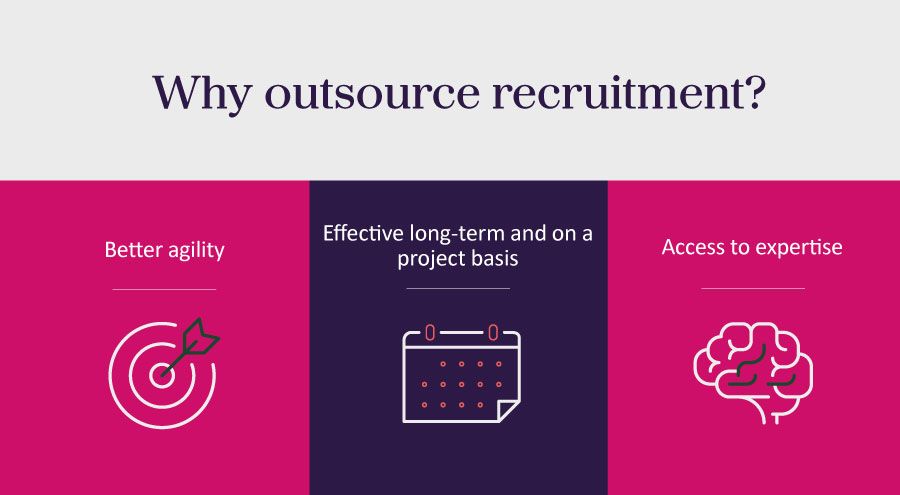Why small/ medium businesses in the DACH region should consider RPO
Commentators:
Josh Bersin
Founder and CEO of The Josh Bersin Company and HR and TA technology analyst
Tanja Lahaye
Client Solutions Director DACH, AMS
Rebecca Wettemann
Founder and CEO of market analysis firm, Valoir

Understanding when to delegate tasks and let go is a challenge for all business leaders, but it is especially difficult for those running startups and small to medium size enterprises.
When is the right time to hand over the reins to an expert and focus on something different? How do you know when you need help? Most importantly, when will the benefits of outsourcing outweigh the costs?
Germany alone is home to more than 2.6 million small / medium enterprises employing 19 million people, approximately half of its entire workforce. Hundreds of thousands of new small firms are created each year, boosting the economy and building new jobs. Yet finding, attracting and onboarding quality talent can be a problem for small businesses.
There is a misconception in talent acquisition that recruitment process outsourcing (RPO) is only for big businesses with big turnovers. However, RPO can be hugely effective for SMEs and mid-size companies who are growing rapidly in scale and geographic reach.
Expertise and access
This is because RPO isn’t just about delivering quality recruits at a reduced cost. It’s also about tapping into expertise, talent pools and capacity that you might not otherwise have access to.
“In SMEs there is a feeling that what makes you great is that you do everything. They are concerned that when they leverage a company like AMS they will lose control of what makes their business theirs,” says Tanja Lahaye, Client Solutions Director EMEA, at AMS.
“In reality, when we partner with SMEs we are an extension of their organization. We aren’t AMS, we are them,” she adds.
Lahaye gives three ways that a RPO provider can help small and midsize companies develop talent acquisition.
“Right now, hiring is on the side of corporations, not talent. There is a deluge of people coming in, but they aren’t always the right people with the right skills.
“Hiring managers are misusing their time as they can’t get through all the candidates applying for roles. The knock-on effect of this is that the candidate experience is really bad as hiring managers are spread too thin. Candidates don’t get responses and this erodes the company’s brand,” says Lahaye.
As the talent market fluctuates and becomes a candidate market again, these brands become less desirable as candidates recall previous poor experiences and share them with other potential recruits. Working with a RPO provider allows SMEs to consistently offer candidates a good experience while also identifying the right talent to pursue.

Your voice and brand
Secondly, outsourcing recruitment to an RPO provider gives SMEs better agility and creativity in the talent market.
“We’re often able to help clients by taking on a portion of their business so that they can focus on other areas,” says Lahaye.
“They can choose to invest in training their people to get better in certain areas, whether sourcing, skills development or identifying more diverse candidates, or simply focus on what they are best at from a talent acquisition perspective,” she adds.
Finally, recruitment process outsourcing allows businesses to access expertise, knowledge and experience in a way they wouldn’t be able to do so in-house - while retaining control of their business.
“Dependent on size, some small to mid-sized businesses might not even have a ‘true’ recruitment function. Their talent teams might do benefits, employee relations and recruitment all as part of the same job, pulling people in different directions and taking them away from what they are good at,” says Lahaye.
“When SMEs work with us, they control the process. They can choose to purchase the piece where they need expertise, whether that’s people who understand how to use recruitment technology, know where to find people or develop procedures - and they do it efficiently in the client’s mechanisms.”
According to HR and TA technology analyst Josh Bersin, recruiting has grown more challenging thanks to a labor shortage and the high demand for skilled candidates. Not only are highly-skilled roles in great demand, but recruiting technologies, tools, and systems are radically changing, according to the founder and CEO of The Josh Bersin Company.
“By working with a deeply experienced RPO firm, regardless of size, companies can quickly upgrade their process and technology, and take advantage of deep expertise in this complex area”, he tells AMS Catalyst. “I see RPO as a steady and increasingly important part of the HR marketplace, growing in importance over time.”

Your voice and brand
Secondly, outsourcing recruitment to an RPO provider gives SMEs better agility and creativity in the talent market.
“We’re often able to help clients by taking on a portion of their business so that they can focus on other areas,” says Lahaye.
“They can choose to invest in training their people to get better in certain areas, whether sourcing, skills development or identifying more diverse candidates, or simply focus on what they are best at from a talent acquisition perspective,” she adds.
Finally, recruitment process outsourcing allows businesses to access expertise, knowledge and experience in a way they wouldn’t be able to do so in-house - while retaining control of their business.
“Dependent on size, some small to mid-sized businesses might not even have a ‘true’ recruitment function. Their talent teams might do benefits, employee relations and recruitment all as part of the same job, pulling people in different directions and taking them away from what they are good at,” says Lahaye.
“When SMEs work with us, they control the process. They can choose to purchase the piece where they need expertise, whether that’s people who understand how to use recruitment technology, know where to find people or develop procedures - and they do it efficiently in the client’s mechanisms.”
According to HR and TA technology analyst Josh Bersin, recruiting has grown more challenging thanks to a labor shortage and the high demand for skilled candidates. Not only are highly-skilled roles in great demand, but recruiting technologies, tools, and systems are radically changing, according to the founder and CEO of The Josh Bersin Company.
“By working with a deeply experienced RPO firm, regardless of size, companies can quickly upgrade their process and technology, and take advantage of deep expertise in this complex area”, he tells AMS Catalyst. “I see RPO as a steady and increasingly important part of the HR marketplace, growing in importance over time.”
Project RPO
Recruitment is a labor intensive process that takes time and effort, often with specialist knowledge. Very few mid-sized businesses have the finances and desire to employ a single recruitment specialist, let alone an entire team. Partnering with a RPO provider gives expanding organizations access to expertise at a fraction of the cost. Effectively, SMEs can get recruitment expertise on a pay-per-use model.

This can be particularly useful to businesses that are expanding rapidly into new geographies and sectors. Buying region-specific recruitment knowledge around hiring laws and talent expectations can be invaluable in moving quickly and effectively.
This leads to another misconception around RPO. Many talent professionals believe that RPO is only effective for long-term, complex recruitment challenges. In reality, RPO can be hugely helpful in managing capacity gaps and talent acquisition capability on a project by project basis and Rebecca Wettemann, founder and CEO of market analysis firm Valoir, supports this view.
“For HR and talent acquisition teams with limited bandwidth, which is almost everyone, RPO is more than just an augmentation of existing resources. RPO can enable HR and talent leaders to scale up and down their recruitment efforts as needed while maintaining access to a broader and diverse field of talent.”
Wettemann went on to explain that “because RPO’s are focused specifically on the talent acquisition process, they can bring up to date knowledge to talent pools and the most effective means to reach them. This is particularly important in areas of new demand or high specialization, or hard-to-find candidates. And of course, RPO’s provide strategic advice and develop recruiting strategies based on in-depth and up-to-date knowledge of evolving regulations and different compliance requirements for different locations, industries, and job roles. Critically, RPO’s are able to leverage their investments and knowledge in people analytics and other cutting-edge technologies to deliver their benefits to their clients without clients having to tackle investments.”
So why should smaller companies consider partnering with a recruitment process outsourcing company to deal with their talent acquisition needs?
By providing access to expert, experienced recruiters, RPO providers can improve your recruitment processes and outcomes, allowing you to focus more on the day-to-day requirements of your business. It can save you money in the long-term on recruitment, while also bringing you better and more diverse candidates. It can also help you develop better internal processes and procedures, all while maintaining your voice and branding.
“If you embrace walking shoulder to shoulder with an RPO provider on the journey of talent attraction, it can only make your talent acquisition team stronger,” smiles Lahaye.
written by the Catalyst Editorial Board
with contribution from:

Josh Bersin
Founder and CEO, The Josh Bersin Company and HR and TA technology analyst
Tanja Lahaye
Client Solutions Director DACH, AMS
Rebecca Wettemann
Founder and CEO of market analysis firm, Valoir

